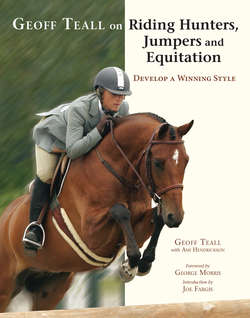Читать книгу Geoff Teall on Riding Hunters, Jumpers and Equitation - Geoff Teall - Страница 8
На сайте Литреса книга снята с продажи.
Оглавление1
An Introduction to Balanced Riding
A Definition of Terms
This is a book about riding.
It is about riding in the most correct, skilled, beautiful, and balanced way possible. It is about understanding the merits of fundamental horsemanship principles and applying them to your efforts. It is about knowing what you want to do with your riding and equipping yourself for success.
For many, good riding that is correct in both form and function is synonymous with equitation. But talking about equitation can be a tricky business.
In the hunter world, Hunt Seat Equitation is a competitive division. With a few exceptions, that division is open primarily to junior riders. It is intended to make riders aware of good position and to create a solid foundation built on strong basic skills.
The annual Hunt Seat Equitation Finals are the pinnacle of the division. Here the most correct, most polished, and most accomplished riders shine.
In hunt seat circles, finals winners are a very big deal. They often go on to enjoy lengthy, successful careers hunting, jumping, or eventing. But then, so do those who begin riding too late in life to compete in equitation classes—which brings me to the larger definition of the term.
I see equitation as more than just a division of competition dedicated to making young riders into good riders.
To me, equitation is a means to an end. The word literally means “the art of riding on horseback.” It encompasses the concepts of horsemanship, correctness of position, and riding skills.
The rider who applies the basic principles of equitation hones his skills and develops the tools he will need for a lifetime with horses.
My entire approach to training effective riders is built on this philosophy. I believe that an understanding and a mastery of sound riding principles gives the hunt seat rider the skills needed to succeed in all facets of riding including jumping, dressage, showing hunters, fox hunting, or pleasure riding.
1.1 “Equitation” denotes an approach to riding, and to horses in general, that focuses on balance, control, harmony, and grace.
1.2 A sound equitation foundation will allow you to succeed in any riding endeavor.
The Benefits of Equitation
A thorough understanding of the fundamentals of good horsemanship benefits the rider in many ways. As a rider, perfecting your form and position provides you with a wealth of skills that will help you cope with the problems and difficult situations you will surely encounter in your riding career.
Equitation work stretches you. Equitation riders learn more about lengthening and shortening, turning, lightening, and making their horses responsive than most riders in other disciplines.
Since fine-tuning your equitation skills involves learning how to ride into and out of specific problems, you learn a lot about training. Not only do you learn how to train yourself to jump with fluidity, style, and grace, but you also learn how to train your horse to do the same.
The Equitation Foundation
When equitation is done well, it creates a solid riding foundation. It will help you understand sound training principles. An equitation background has the potential to give you a wonderfully broad base for your riding.
Focusing on your form, your balance, and your position will improve your riding in other areas. It can help polish you as a spectacular hunter rider. Your training will make your style greater, which will dress up any horse you ride.
Perfecting your position, your poise, and your timing can help make you a great jumper rider because your basic skills will be grounded in efficiency. You will also have gained invaluable experience in training horses and in making them rideable.
The Larger Picture
Many benefits may be gained from concentrating on perfecting your equitation—and not all of them have to do with better riding.
Equitation work takes discipline. It improves your time management skills. It teaches you to control your attitude and your outlook. It strengthens your coordination and gives you experience in getting along with both people and animals.
In many respects, just about all of life’s lessons—anything you need to know in order to deal with people in the “real world”—will be learned from working with horses, trainers, and fellow competitors.
